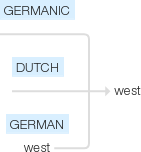West
Old English, of Germanic origin; related to Dutch and German west, from an Indo-European root shared by Greek hesperos, Latin vesper ‘evening’.
wiktionary
From Middle English west, from Old English west, from Proto-Germanic *westrą. Cognate with Scots wast, Saterland Frisian Wääste, West Frisian west, Dutch west, German West, Danish vest. Cognate also with Old French west, French ouest, Spanish oeste, Catalan oest, Galician oeste, Italian ovest (all ultimately borrowings of the English word). Compare also Latin vesper.
etymonline
west
Old English west (adv.) "in or toward the west, in a westerly direction," from Proto-Germanic *west- (source also of Old Norse vestr, Old Frisian, Middle Dutch, Dutch west, Old High German -west, only in compounds, German west), which is of uncertain origin. Perhaps from PIE *wes-, reduced form of *wes-pero- "evening, night" (source also of Greek hesperos, Latin vesper "evening, west;" see vesper). Compare also High German dialectal abend "west," literally "evening." French ouest, Spanish oeste are from English.
As an adjective from late 14c.; as a noun from late 12c. West used in geopolitical sense from World War I (Britain, France, Italy, as opposed to Germany and Austria-Hungary); as contrast to Communist Russia (later to the Soviet bloc) it is first recorded in 1918. West Coast of the U.S. is from 1850; West End of London is from 1776; West Side of Manhattan is from, 1858. The U.S. West "western states and territories" originally (1790s) meant those just west of the Alleghenies; the sense gradually extended as the country grew. To go west "die" was "common during the Great War" [OED, 2nd ed.], perhaps from Celtic imagery or from the notion of the setting sun. In U.S. use, in a literal sense "emigrate to the western states or territories," from 1830.
